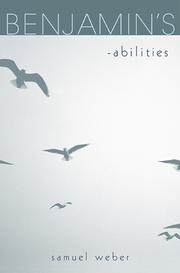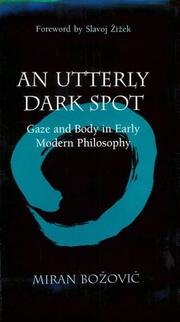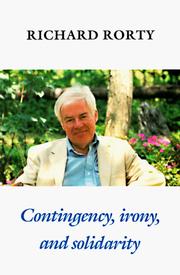| Listing 1 - 10 of 173 | << page >> |
Sort by
|
Book
Year: 2012 Publisher: Project Gutenberg
Abstract | Keywords | Export | Availability | Bookmark
 Loading...
Loading...Choose an application
- Reference Manager
- EndNote
- RefWorks (Direct export to RefWorks)
Antinoüs --- approximately 110-130 --- Fiction
Book
ISBN: 9020900552 Year: 1970 Publisher: Tielt : Lannoo,
Abstract | Keywords | Export | Availability | Bookmark
 Loading...
Loading...Choose an application
- Reference Manager
- EndNote
- RefWorks (Direct export to RefWorks)
130.12 --- Filosofie (wijsbegeerte) --- Filosofie (Heidegger)

ISBN: 9780674028371 0674028376 0674033957 0674046064 Year: 2008 Publisher: Cambridge, Mass. : Harvard University Press,
Abstract | Keywords | Export | Availability | Bookmark
 Loading...
Loading...Choose an application
- Reference Manager
- EndNote
- RefWorks (Direct export to RefWorks)
In this book, Weber, a leading theorist on literature and media, reveals a new and productive aspect of Benjamin's thought by focusing the critical suffix "-ability" that Benjamin so tellingly deploys in his work. The result is an illuminating perspective on Benjamin's thought by way of his language - and one of the most penetrating and comprehensive accounts of Benjamin's work ever written.
literatuur --- literatuurfilosofie --- filosofie --- Benjamin Walter --- cultuurfilosofie --- 130.2 --- Benjamin, Walter,
Book
Abstract | Keywords | Export | Availability | Bookmark
 Loading...
Loading...Choose an application
- Reference Manager
- EndNote
- RefWorks (Direct export to RefWorks)
#GROL:SEMI-130.2:6 --- Philosophy of science --- Wetenschapsfilosofie
Book
ISBN: 9031710415 Year: 1994 Volume: 10 Publisher: Averbode Altiora
Abstract | Keywords | Export | Availability | Bookmark
 Loading...
Loading...Choose an application
- Reference Manager
- EndNote
- RefWorks (Direct export to RefWorks)
Er schuilt een paradox in de manier waar op men in de huidige Westerse cultuur om gaat met lichamelijkheid. Enerzijds is er een overwaardering van het lichaam in de reclame, de media, de film... Veel aandacht gaat daarbij naar het seksuele. Anderzijds heerst er een zekere armoede in de lichamelijke omgang tussen men het lichaam wordt zelden bewust gebruikt als middel tot communicatie. Lichamelijke tederheid wordt ondergewaardeerd. Velen hanteren een mensenlichaam als een ding, een te objectiveren iets. Maar een mens is niet los te maken van zijn lichaam. Ik heb niet alleen een lichaam, ik ben ook mijn lichaam. Ik ben wie ik hen, met heel mijn lijf. Het eerste deel van dit cahier bevat een fundamentele bezinning over lichamelijkheid. Lichamelijkheid tussen hebben en zijn, subjectiverend of objectiverend; het lichaam als bron van mogelijkheden tot communicatie; het bijbelse Hooglied en de genezingsver halen in het Nieuwe Testament; de eerder lichaamsvijandige houding van het christendom, en toch ook: de verrijzenis van het lichaam, de naaktheid als paradijservaring. In het tweede deel gaan de auteurs op zoek naar concrete domeinen waarin lichamelijkheid een belangrijke rol speelt: de seksualiteit, de medische wereld, de dans, de mode, het pastorale gesprek, de liturgie, de zorg voor gehandicapten. In het Leerhuis ten slotte wordt het vak expressie belicht, en de lichamelijkheid in poëzie en film. (Bron: covertekst)
130.14 --- #gsdb11 --- christendom --- filosofie --- Lichaamstaal --- Lichaam en geest (filosofie) --- Lichaamscultuur --- Wijsgerige antropologie: lichaam --- 130.14 Wijsgerige antropologie: lichaam

ISBN: 128263884X 9786612638848 0472023195 9780472023196 047211140X 9781282638846 6612638842 9780472111404 Year: 2000 Publisher: Ann Arbor
Abstract | Keywords | Export | Availability | Bookmark
 Loading...
Loading...Choose an application
- Reference Manager
- EndNote
- RefWorks (Direct export to RefWorks)
Two concepts of special interest to contemporary theorists--the gaze and the body--approached in a fresh and fascinating way.
Book
ISBN: 9781509533381 9781509533398 Year: 2019 Publisher: Cambridge Polity Press
Abstract | Keywords | Export | Availability | Bookmark
 Loading...
Loading...Choose an application
- Reference Manager
- EndNote
- RefWorks (Direct export to RefWorks)
We think that we live in democracies: in fact, we live in mediarchies. Our political regimes are based less on nations or citizens than on audiences shaped by the media. We assume that our social and political destinies are shaped by the will of the people without realizing that 'the people' are always produced, both as individuals and as aggregates, by the media: we are all embedded in mediated publics, 'intra-structured' by the apparatuses of communication that govern our interactions. In this major book, Yves Citton maps out the new regime of experience, media and power that he designates by the term 'mediarchy'. To understand mediarchy, we need to look both at the effects that the media have on us and also at the new forms of being and experience that they induce in us. We can never entirely escape from the effects of the mediarchies that operate through us but by becoming more aware of their conditioning, we can develop the new forms of political analysis and practice which are essential if we are to rise to the unprecedented challenges of our time. This comprehensive and far-reaching book will be essential reading for students and scholars in media and communications, politics and sociology, and it will be of great interest to anyone concerned about the multiple and complex ways that the media - from newspapers and TV to social media and the internet - shape our social, political and personal lives today.
Mass media and public opinion. --- Mass media --- Influence. --- Political aspects. --- cultuurfilosofie --- mediakunde --- mediatheorie --- 130.2 --- politiek
Book
Year: 2010 Publisher: To be supplied : Project Gutenberg,
Abstract | Keywords | Export | Availability | Bookmark
 Loading...
Loading...Choose an application
- Reference Manager
- EndNote
- RefWorks (Direct export to RefWorks)
Antinoüs --- approximately 110-130 --- Poetry --- Hadrian --- Emperor of Rome --- 76-138
Book
ISBN: 9058751295 9789058751294 Year: 2005 Publisher: Nijmegen : SUN,
Abstract | Keywords | Export | Availability | Bookmark
 Loading...
Loading...Choose an application
- Reference Manager
- EndNote
- RefWorks (Direct export to RefWorks)
-5875-129-5
Culture --- Philosophy. --- Hulpwetenschappen --- Filosofie. --- cultuurfilosofie --- Philosophy and psychology of culture --- 130.2 --- 651 Maatschappij. Algemeen --- #A0411A --- 130.2 Filosofie van de cultuur. Cultuurfilosofie. Cultuursystemen. Kultuurfilosofie --- Filosofie van de cultuur. Cultuurfilosofie. Cultuursystemen. Kultuurfilosofie --- Philosophy --- Cultuur --- Cultuurkritiek --- Cultuurfilosofie --- Toerisme

ISBN: 0521367816 0521353815 1316084590 1139638041 1139640887 0511804393 1139648527 1139635700 9780521353816 9780521367813 9780511804397 9781139648523 9781139635707 9781316084595 9781139638043 9781139640886 Year: 1991 Publisher: Cambridge ; New York, NY : Cambridge University Press,
Abstract | Keywords | Export | Availability | Bookmark
 Loading...
Loading...Choose an application
- Reference Manager
- EndNote
- RefWorks (Direct export to RefWorks)
In this 1989 book Rorty argues that thinkers such as Nietzsche, Freud, and Wittgenstein have enabled societies to see themselves as historical contingencies, rather than as expressions of underlying, ahistorical human nature or as realizations of suprahistorical goals. This ironic perspective on the human condition is valuable on a private level, although it cannot advance the social or political goals of liberalism. In fact Rorty believes that it is literature not philosophy that can do this, by promoting a genuine sense of human solidarity. A truly liberal culture, acutely aware of its own historical contingency, would fuse the private, individual freedom of the ironic, philosophical perspective with the public project of human solidarity as it is engendered through the insights and sensibilities of great writers. The book has a characteristically wide range of reference from philosophy through social theory to literary criticism. It confirms Rorty's status as a uniquely subtle theorist, whose writing will prove absorbing to academic and nonacademic readers alike.
-#GROL:SEMI-130.2:8 --- --Philosophie --- Language and languages --- Foreign languages --- Languages --- Philosophy --- Philosophy. --- Philosophy of language --- Political philosophy. Social philosophy --- Langage --- --Language and languages --- #GROL:SEMI-130.2:8 --- Irony --- Langage et langues --- Ironie --- Philosophie --- Arts and Humanities
| Listing 1 - 10 of 173 | << page >> |
Sort by
|

 Search
Search Feedback
Feedback About UniCat
About UniCat  Help
Help News
News